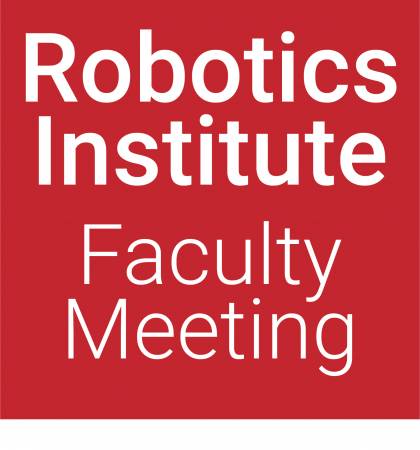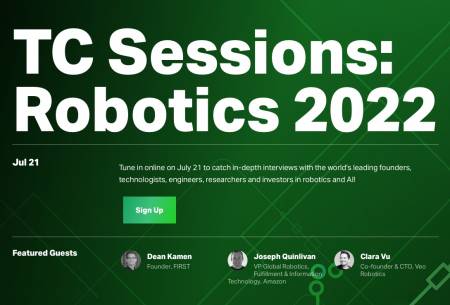Carnegie Mellon University
Control Input and Natural Gaze for Goal Prediction in Shared Control
Abstract: Teleoperated systems are used widely in deployed robots today, for such tasks as space exploration, disaster recovery, or assisted manipulation. However, teleoperated systems are difficult to control, especially when performing high-dimensional, contact-rich tasks like manipulation. One approach to ease teleoperated manipulation is shared control; this strategy combines the user's direct control input with an [...]
Forecasting from LiDAR via Future Object Detection
Abstract: Object detection and forecasting are fundamental components of embodied perception. These two problems, however, are largely studied in isolation by the community. In this paper, we propose an end-to-end approach for detection and motion forecasting based on raw sensor measurement as opposed to ground truth tracks. Instead of predicting the current frame locations and [...]
Details to Follow . . .
Details to Follow . . .
Efficient 3D Representations: Algebraic Surfaces for Differentiable Rendering
Abstract: In this proposal, we show how some classic computer vision tasks can robustly be solved via optimization techniques by using an object representation that is compact and interpretable. Specifically, we explore the applications and benefits of representing 3D objects with an analytical, algebraic function by building an approximate, ray-based differentiable renderer. Our approximate formulation [...]
Carnegie Mellon University
Liquid Metal Actuators
Abstract: This thesis contributes to the field of soft actuators by introducing a generalized framework of actuators from liquid metals. The evolution of robotic actuators has enabled robots to achieve a diversity of motions. Like natural muscles, which converts chemical energy into mechanical work in response to electrical stimuli from the nervous system, actuators are [...]
Continual Robot Learning: Benchmarks and Modular Methods
Zoom Meeting Passcode: 841755 Abstract: The earliest reinforcement learning models were designed to learn one task, specified up-front. However, an agent operating freely in the real world will not in general be granted this luxury, as the demands placed on the agent may change as environments or goals change. We refer to this ever-shifting scenario [...]
Carnegie Mellon University
MSR Thesis Talk: Yash Oza
Title: Preprocessing-based Methods for Robotic Manipulation Abstract: Robotic manipulation is a key problem for several applications such as welding, pick-and-place, and automated assembly. However, motion planning for manipulation can be computationally expensive as it requires planning in the high-dimensional configuration space of the manipulator. Additionally, task-specific constraints such as strict time limits or constraints on end-effector [...]
Five Traps for Robots in Human Environments….And How to Avoid Them
Abstract: Robotics today is moving beyond fixed environments and into human spaces like homes, restaurants, and hospitals. In these new spaces, robots will necessarily have to interact with people. In some sense, every recent robotics problem is partly a human-robot interaction problem. Thus, the field of HRI can offer insights to the broader robotics community [...]
MSR Thesis Talk: Ingrid Navarro Anaya
Title: Socially-Aware Trajectory Prediction Guided by Motion Patterns Abstract: As intelligent robots across domains start collaborating with humans in shared environments, e.g., urban settings and terminal airspace, algorithms that enable them to reason over human motion and intent are important to enable seamless and safe interplay. In our work, we study human intent by focusing on the [...]
Carnegie Mellon University
MSR Thesis Talk: Qichen Fu
Date: Tuesday, July 19, 2022 Time: 9:00 AM - 10:00 AM ET Location: Newell-Simon Hall (NSH) 3305 Title: Detect Active Object in a Sequential Voting Process Abstract: A key component of understanding hand-object interactions is the ability to identify the active object -- the object that is being manipulated by the human hand. In order to accurately localize the [...]
Carnegie Mellon University
MSR Thesis Talk: Ruohai Ge
Title: Real-Time Visual Localization System in Changing and Challenging Environments via Visual Place Recognition Abstract: Localization is one of the fundamental capabilities to guarantee reliable robot autonomy. Many excellent Visual-Inertial and LiDAR-based algorithms have been developed to solve the localization problem. However, deploying these methods on a real-time portable device is challenging due to high [...]
TechCrunch Sessions: Robotics 2022
Matt Johnson-Roberson will be one of the featured speakers in TC Sessions: Robotics 2022 on Thursday, July 21. You can register and stream for free! From the TechCrunch event site: Where Minds Meet Machines: The Future of Robotics Rapid advances in robotics technology continue to change the way businesses compete — and how people work [...]
Carnegie Mellon University
MSR Thesis Talk – Zixuan Huang
Title: Seeing the Unseen: Closed-loop Occlusion Reasoning for Cloth Manipulation Robotic manipulation of cloth remains challenging due to the complex dynamics of cloth, lack of a low-dimensional state representation, and self-occlusions. Particularly, self-occlusion makes it difficult to estimate the full state of the cloth, which poses significant challenges to policy learning and dynamics modeling. Ideally, [...]
Carnegie Mellon University
MSR Thesis Talk – Zhaoyuan Fang
Title: Features in Extra Dimensions: Spatial and Temporal Scene Representations Abstract: Computer vision models have made great progress in featurizing pixels of images. However, an image is only a projection of the actual 3D scene: occlusions and perspective distortions exist. To arrive at a better representation of the scene itself, extra dimensions are needed to [...]
Carnegie Mellon University
MSR Thesis Talk – Yunchu Zhang
Title: Library of behaviors and tools for robot manipulation Abstract: Learned policies often fail to generalize across environment variations, such as, different objects, object arrangements, or camera viewpoints. Moreover, most policies are trained and tested in simulation environments, and the sim2real gap remains large under weak visual representations that do not disentangle the scene from [...]
Carnegie Mellon University
Learning Structured World Model for Deformable Object Manipulation
Abstract: Manipulation of deformable objects challenges common assumptions in robotic manipulation, such as low-dimension state representation, known dynamics, and minimal occlusion. Deformable objects have high intrinsic state representation, complex dynamics with high degrees of freedom, and severe self-occlusion. These properties make them difficult for state estimation and planning. In this thesis, we introduce benchmarks and [...]
Safe control under input limits with neural CBF
Abstract: In theory, control barrier functions (CBFs) provide a convenient means to construct provably safe controllers. However, a typical problem is that the constructed controller will exceed input limits, and merely clipping the inputs will break all safety guarantees. To address this practical flaw, we consider synthesizing a CBF that will respect input limits. We [...]
Carnegie Mellon University
MSR Thesis Talk – Chi Yen Lee
Title: Enhancing Quadruped Locomotion Stability with Reaction Wheel Systems and Model Predictive Control Zoom: https://cmu.zoom.us/j/96808397411?pwd=YnFDaFk1WVVyZjc5UndlOTBZL0tjUT09 Abstract: The development of quadruped robots offers a mobility solution that allows robot agents to navigate complicated terrains, making them extremely versatile robots in a variety of environments. Today, there are a number of research challenges facing quadruped development. First, the [...]







